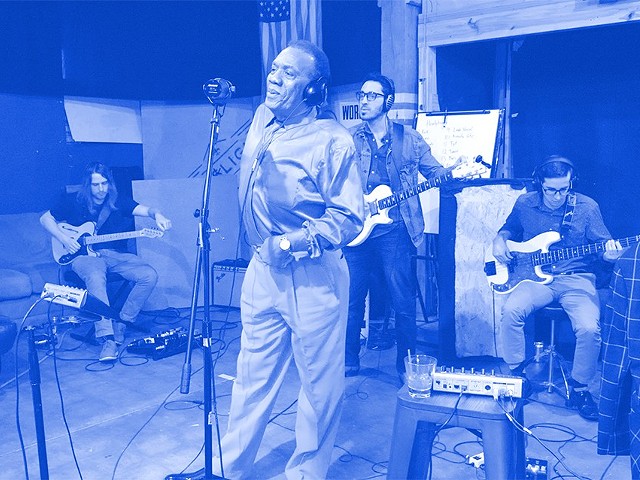Conversations about the blues tend to be conversations about roots, of musical family trees and lineages. Often, the question of when a player began gigging becomes one about who else was on stage then and how that person dated back to those who came before.
St. Louis bluesman Tony Campanella is no different. He's got a new album out, Taking it to the Streets — that's the news hook here — but naturally, he takes it back a bit first.
"I've played in Soulard for 30 years," says Campanella. "Most of my time was spent at the old Mike & Min's, which is no longer around, or at the 1860 Saloon. Mike & Min's was definitely more of a traditional blues bar, and when I came up it was one of the first places for me to play. I was doing that with Tommy Bankhead. While they were very traditional, they were also accepting of what I was doing."
At only twenty, Campanella was gigging before his legal drinking age. A handful of years later, though, a wife and child came into the picture and music took on a different dimension. Though continuing to gig, he was now juggling family life and club life. But a piece of the puzzle was missing: a recording with his name on the cover.
Within the last year, longtime area guitarist and songwriter Mike Zito, who, like Campanella, came up in the scene in the mid-'90s, finally convinced Campanella to release a debut solo album via Zito's own Gulf Coast Records. To get there, he and his band went into the studio with songs from both Zito and Campanella, and the idea of creating as live a sound as possible.
"It was a completely new experience for me. We did a lot of it live, the three of us looking at each other in the studio and letting it happen organically. You could almost compare it to a live show," Campanella says. "It was the three of us in the same room, doing the same parts, not smashing it all together later. For a first-time experience in the studio, it was exactly how I'd have wanted or imagined it to be."
Though Campanella admits he felt some pressure before the recording was completed, he says Zito offered some good advice about being nervous.
"'It's just about capturing a moment in time. So just play in the moment and we'll get a good record,'" he recalls Zito saying. "And he was right about that. I think we have a good-sounding record with good songs. He did an amazing job as a producer, since we did eleven songs in two and a half days. He was the guy, he was the taskmaster. He kept things rolling and, with limited time and budget, he did a great job of keeping us on track and adding little changes that added to the feel, if you will, of my songs. He couldn't have been any better. We made a good record together. "
Campanella says he'd describe his sound as blues-rock. It's an apt description.
"It's not traditional blues. It's a little heavier than that," he says. "It's kind of what I listened to growing up, what I played then. I have a huge influence from my uncles, in particular, who turned me on to traditional blues. But I was also listening to Jimi Hendrix, Van Halen, the Stones. And all of that's in there."
Playing this weekend with peer Jeremiah Johnson, Campanella feels that he's in a unique middle ground of players bringing their own take on the St. Louis blues and linking generations.
He feels, too, that the local blues scene is in a good place in 2019.
"Yeah, I'm very optimistic about the blues scene here," he says. "There's such a foundation of guys like Henry Townsend, Tommy Bankhead, Big George Brock. And then there are new guys like Marquise Knox and Little Dylan that are keeping the tradition going. Then there are guys like me, like Jeremiah, who grew up listening to that older scene, but we've got our own flair. It's an offshoot of that traditional sound and there are still a lot of people who want to hear it."






